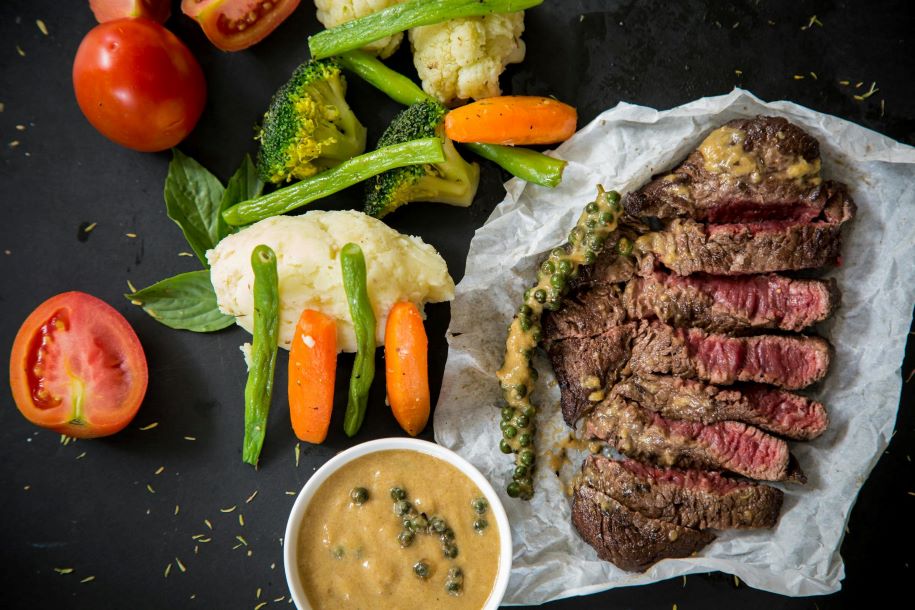
There are different theories as to what our ancestors ate but I’m pretty sure they didn’t obsess over their daily intake of carbs, protein, and fat. They had to hunt, fish, and do their own gardening in order to survive. Most of them had a low body fat percentage because they were always on the move. There wasn’t an endless amount of food, so portions weren’t an issue. I doubt they worried about tracking their daily steps since they had no form of transportation.
Our culture tends to overcomplicate things, and we need to look at food in a different manner. Instead of consistently overindulging or eating with an emotional motive, the focus should be to use food as fuel for our bodies. Real food helps increase energy levels, especially when we try to maintain busy schedules.
I keep meals pretty simple in my house. I strive to eat really good, healthy forms of protein like grass-fed beef, wild-caught fish, and pasture-raised chicken and eggs as often as possible. Organic is another plus I incorporate. I typically pair healthy protein with rice or potatoes and a vegetable or fruit. The less processed food the better! Eating whole foods is the best way to absorb the most nutrients. It’s really not that difficult to plan meals for the week. On Sundays I create a menu and hit the grocery store. I try to do a little baking also because I can control the sugar. Here’s a typical week of meals in my house:
*Ground beef, rice, soy sauce, fruit
*Beef roast, potatoes, vegetables
*Chicken enchilada casserole, pico de gallo
*Gluten free pasta with meat sauce, salad
*Breaded chicken, asparagus, fruit
*Greek chicken salad
*Steak, brussels sprouts, fruit
You can’t get energy from highly processed food. There are fast food restaurants on every corner, but there’s not enough nutritional value to support the stamina you need to get through a long, busy day. Processed food is linked to metabolic syndrome and it’s making people sicker than ever. The only way to fight this epidemic is to go back to basics and eat real food and stay active. According to the Mayo Clinic, 1/3 of US adults have metabolic syndrome and these individuals are at a higher risk for heart disease, stroke, and type II diabetes. Here is a list of conditions associated with the metabolic disease:
*Large waist circumference (more than 40 inches for men, 35 for women)
*Increased blood sugar
*High blood pressure
*Hypertriglyceridemia
*Low HDL cholesterol
National Geographic’s article, “The Evolution of Diet” talks about the ramifications of the foods we choose to eat over the next thirty years and how it will affect the planet. Foraging lifestyles are being studied in a handful of countries because these populations didn’t develop high blood pressure, atherosclerosis, or cardiovascular disease. The article is intriguing, and I recommend you take a look at it.
I cook real food for my family because I know it’s best for them and they will be better off. I try not to cut corners since their health will suffer. If you were raised on mostly processed food, then start making changes gradually one item at a time. Start with the foods you consume the most and this will have the biggest impact. Meal planning can also revolve around what you already have in your fridge or pantry. This is a great way to save money on your grocery bill.
Cook with minimal ingredients and stick with what you know and what you’re comfortable cooking and build from there. Experimenting with seasonings outside of salt and pepper can go a long way to add flavor and variety to your weekly meal plan. If you make extra for dinner, then save a portion for the next day’s lunch. This takes the stress off what to pack and the temptation of grabbing fast food in a pinch.
Convenience foods should only be eaten sparingly and if you plan accordingly, it shouldn’t become an issue as long as your planning is on track. Make coffee at home and stay away from sugary coffee drinks due to their ridiculous cost and calories. This is another way of saving money, especially now that eating out has gotten pricey.
Dr. Sukol of the Cleveland Clinic states that there are 11 varieties of food (listed below.) The article “Skip the Fads: Why You Should Eat a Real-Food Diet,” mentions that any foods outside of these 11 are just for entertainment. What a great way to remind us that we should be mindful of the food we’re eating and need to put more thought into our nutrition plans. The article goes on to say that your brain can tell the difference between real food and processed food.
11 Varieties
Fruits
Veggies
Beans
Whole grains (I limit grains)
Nuts
Seeds
Dairy
Eggs
Meat
Fish
Poultry
I am still in the process of weaning off certain processed foods, but I feel pretty good about where our meals stand. Minimally processed items such as tomato sauce are better than ultra processed foods like pop, which is detrimental to your health. According to Medical News Today’s article “Is Soda Bad for Your Health and What are the Options?,” the sugar content is high and can be linked to diabetes, weight gain, and cardiovascular conditions not to mention there’s no real nutritional value in soda.
Real food typically resides around the perimeter of the grocery store and your focus should be there the majority of the time. Eating the best food is really important to me to the point that I wake up at 5:30 every morning to cook breakfast for my teen boys. I still worry they aren’t getting enough protein or calories. They are lean athletes that never stop moving and are always on the go. Regardless of whether you follow certain diets like paleo or vegan, eating real food is the only way to ensure that you are consuming adequate nutrients for energy. I don’t count macros or calories although I am intrigued by the whole concept. We don’t eat “low carb” or “keto,” but I question the amount of carbohydrates we eat sometimes. Now that my boys have been diagnosed with celiac disease, I feel that our nutrition has improved without eating ultra-processed wheat products. If you’re looking for gluten-free recipes, follow my blog. I’ll be adding some of my favorite recipes.
Start being mindful of what you’re eating and the quantity. Only eat until you’re full. You don’t need multiple servings just because you like the way it tastes. Stay away from all you can eat buffets. As I mentioned earlier, make a point to look at food as fuel instead of another way to overindulge. Our culture loves over-doing it! Take notice of why you’re eating. Emotions play a large role whether you’re happy and celebrating or sad and self-sabotaging. Are you eating because you had a bad day? Overeating causes bloating, heart burn, poor sleep, weight gain, and guilt because you didn’t control yourself.
Doctors get little to no training on nutrition so it’s a good idea to do your own research and educate yourself. Remember to keep your meal planning simple with whole foods and healthy eating will become natural for you. Stick to eating the 11 varieties mentioned above and you’ll feel much better overall. Your body and brain will thank you! Good luck!
Sign up for my free monthly newsletter at the bottom of the home page of my blog or reach out anytime to Kim at nourishandflex@gmail.com

